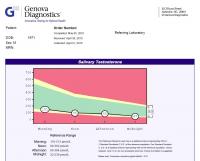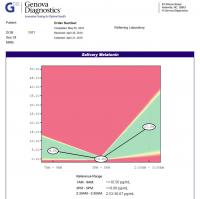Sorry, I wasn't clear. I was referring to the possible telemorase inhibition property it shows in some circumstances, and was wondering if it might interfere in the same was resveratrol seemed to. That page at Vince's blog has a slew of studies, so I'll paste the relevant one here:Testing Fish oil / Omega-3 ?
Personally, I am also starting to think one needs to start/keep taking these in some form or another. As for testing it...
The recent longitudinal study showed a 32% decrease in the odds of telomere shortening over 5 years. So I suppose cancerous cells may be the only kind in which it displays an inhibitory response, but isn't this what can be concluded about resveratrol from the literature as well?Polyunsaturated fatty acids inhibit telomerase activity in DLD-1 human colorectal adenocarcinoma cells: a dual mechanism approach.
As high telomerase activity is detected in most cancer cells, telomerase represents a promising cancer therapeutic target. We investigated the inhibitory effect of various fatty acids on telomerase, with particular emphasis on those with antitumor properties, such as eicosapentaenoic acid (EPA) and docosahexaenoic acid (DHA). To evaluate the direct effect of fatty acids on telomerase, cell lysates of DLD-1 human colorectal adenocarcinoma cells were mixed with sample fatty acids, and the telomerase activity was determined. Saturated fatty acids and trans-fatty acids showed very weak or no inhibition of telomerase. In contrast, cis-unsaturated fatty acids significantly inhibited the enzyme, and the inhibitory potency was elevated with an increase in the number of double bonds. Accordingly, polyunsaturated fatty acids (PUFAs), like EPA and DHA, appeared to be powerful telomerase inhibitors. To assess the transcriptional effect, DLD-1 cells were cultured in the presence of sample fatty acids, and telomerase activity and gene expression were subsequently evaluated. Culturing DLD-1 cells with either EPA or DHA resulted in a remarkable decrease in telomerase activity. EPA and DHA inhibited telomerase by down-regulating human telomerase reverse transcriptase (hTERT) and c-myc expression via protein kinase C inhibition. These results indicate that PUFAs can directly inhibit the enzymatic activity of telomerase as well as modulate the telomerase at the transcriptional level.
PMID: 16216547 [PubMed - indexed for MEDLINE]
Since fish oil is near the top of a lot of people's no-brainer supplement list, having a more specific answer about how it might interact with the astragalus compounds would be pretty valuable.
Edited by chrono, 20 April 2010 - 11:51 PM.
































 This topic is locked
This topic is locked





















